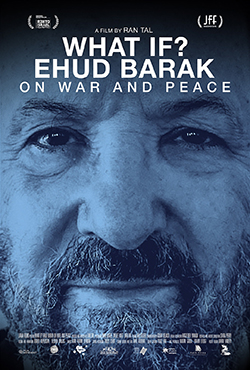By Donald H. Harrison

 SAN DIEGO — Israeli Filmmaker Ran Tal has put together a fascinating documentary in which former Israeli Prime Minister Ehud Barak contemplates whether Middle Eastern history would have changed if plans to assassinate Palestinian leader Yasser Arafat had been approved during the 1970s by his superiors. At that time, Barak was an up and coming officer in the IDF, not important enough to make policy, but sufficiently well placed to carry it out.
SAN DIEGO — Israeli Filmmaker Ran Tal has put together a fascinating documentary in which former Israeli Prime Minister Ehud Barak contemplates whether Middle Eastern history would have changed if plans to assassinate Palestinian leader Yasser Arafat had been approved during the 1970s by his superiors. At that time, Barak was an up and coming officer in the IDF, not important enough to make policy, but sufficiently well placed to carry it out.
In the documentary What If? Ehud Barak on War and Peace, Barak said that he was within the chain of command as a plan to assassinate Arafat was developed. The thought was that as Arafat traveled in a convoy in Lebanon, his convoy could be diverted to a side road and there attacked from the air. Although there had been assassinations of Palestinian military figures, the word came back down the Israeli chain of command to leave Arafat alone. He was a political leader, not a military target, was the explanation.
Some nine years later, Ariel Sharon became Israel’s minister of defense, and he asked whether there was any plan to assassinate Arafat. When told that such a plan had been rejected back in the 1970s, Sharon told Barak to devise another plan.
The question posed to Barak was not simply one of speculative curiosity. In the year 2000, Barak and Arafat were brought together at Camp David by U.S. President Bill Clinton to see if they could come to a final resolution of all the issues dividing the Israelis and the Palestinians.
Many of the issues—such as borders, refugees, and security – were within reach of agreement, but one issue remained intractable, that of Jerusalem. Barak was willing to cede areas of the city with Arab populations to the Palestinians, while retaining those with Jewish populations. He agreed that the Old City could be divided so that the Palestinians had sovereignty over the Muslim and Christian quarters, while Israel would have sovereignty over the Jewish and Armenian quarters. Barak wanted to retain Israel sovereignty over the Temple Mount, the area where Muslims have the Dome of the Rock and the Al Aqsa Mosque and where Jews believe the First and Second Temples of antiquity stood. Barak offered to Arafat a compromise that the Mount could be under Arab management.
Arafat would not agree to this proposal, notwithstanding President Clinton’s urging. After the historic meeting broke up in failure, Clinton laid the blame at Arafat’s feet. Shortly thereafter, the Second Intifada broke out, resulting in the deaths of 2,700 Palestinians and 1,100 Israelis. Nine months after Camp David, Barak was defeated for Prime Minister by Ariel Sharon.
So, what would have happened if Arafat had been assassinated a quarter century earlier? Would another Palestinian leader have come to the fore, who might have been more amenable to a lasting solution? Barak responded that there was no way of knowing.
However, he remembered that in 1992, when he was the IDF Chief of Staff under Prime Minister Yitzhak Rabin, that Israel assassinated Hezbollah’s Secretary General Sayyed Abbas Moussawi in a missile strike in Lebanon that also killed his wife, 5-year-old son, and four guards.
Barak said he did not regret taking the action he did, even though Moussawi’s wife and daughter were slain in the process. Harming uninvolved people is an unfortunate outcome in some military situations, but it is unavoidable, he said. If military forces were afraid under such situations to strike, it could paralyze them, he said.
Moshe Arens, who was Israel’s defense minister at the time, said he thought the assassination sent a message to all terrorist organizations.
But Hezbollah struck back bombing the Israeli Embassy in Buenos Aires, Argentina, killing 29 persons and injuring more than 250 others. Two years later, the AMIA Jewish community building in Buenos Aires was bombed, with 87 people killed and 100 people injured. Moussawi meanwhile was replaced as General Secretary by Hassan Nasrallah. “So which was worse?” Barak pondered.
In 2000 Barak ordered Israeli forces to pull out of Lebanon, likening his country’s presence there to a situation that would lead to constant escalation, just as he had seen earlier in his career when Israel occupied the Sinai Desert and the eastern bank of the Suez Canal. One side builds a fortification, so the other side gets a more powerful weapon to shell it. Then the other side builds a stronger fortification, and so on.
Ran Tal’s fascinating documentary explores Barak’s childhood on a kibbutz, his rise through the ranks, his devotion to the legacy of Yitzhak Rabin, and other topics. It also includes footage of other important Israeli leaders – David Ben-Gurion, Golda Meir, Menachem Begin, Yitzhak Rabin, and Ariel Sharon, among them – to explain historic influences on Barak’s career and decision making.
It is perhaps the most interesting and candid filmed conversation with a former Middle Eastern leader that you might ever see. It premiers on VOD and Digital on April 7.
*
Donald H. Harrison is editor emeritus of San Diego Jewish World. He may be contacted via donald.harrison@sdjewishworld.com